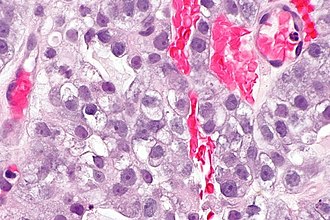Difference between revisions of "Clear cell carcinoma of the uterine cervix"
Jump to navigation
Jump to search
| Line 1: | Line 1: | ||
{{ Infobox diagnosis | |||
| Name = {{PAGENAME}} | |||
| Image = Clear cell carcinoma - gynecologic tract -- very high mag.jpg | |||
| Width = | |||
| Caption = Clear cell carcinoma of the gynecologic tract. [[H&E stain]]. | |||
| Synonyms = | |||
| Micro = cells with clear cytoplasm (may be focal), hobnail pattern), moderate-to-severe [[nuclear pleomorphism]], usu. tubular and/or cystic morphology (may be (simple) papillary and/or solid) | |||
| Subtypes = | |||
| LMDDx = c[[Clear cell carcinoma of the endometrium]], [[serous carcinoma of the endometrium]], [[serous carcinoma]] of the uterine cervix, [[mesonephric adenocarcinoma]], other [[clear cell tumours]] | |||
| Stains = | |||
| IHC = | |||
| EM = | |||
| Molecular = | |||
| IF = | |||
| Gross = | |||
| Grossing = | |||
| Staging = | |||
| Site = [[uterine cervix]] | |||
| Assdx = | |||
| Syndromes = | |||
| Clinicalhx = +/-diethylstilbestrol (DES) exposure | |||
| Signs = | |||
| Symptoms = | |||
| Prevalence = | |||
| Bloodwork = | |||
| Rads = | |||
| Endoscopy = | |||
| Prognosis = | |||
| Other = | |||
| ClinDDx = | |||
| Tx = | |||
}} | |||
'''Clear cell carcinoma of the uterine cervix''', also '''cervical clear cell carcinoma''', is a rare malignancy of the [[uterine cervix]] that classically is associated with diethylstilbestrol (DES) exposure. It typically occurs in younger women. | '''Clear cell carcinoma of the uterine cervix''', also '''cervical clear cell carcinoma''', is a rare malignancy of the [[uterine cervix]] that classically is associated with diethylstilbestrol (DES) exposure. It typically occurs in younger women. | ||
Revision as of 06:41, 30 December 2015
| Clear cell carcinoma of the uterine cervix | |
|---|---|
| Diagnosis in short | |
 Clear cell carcinoma of the gynecologic tract. H&E stain. | |
|
| |
| LM | cells with clear cytoplasm (may be focal), hobnail pattern), moderate-to-severe nuclear pleomorphism, usu. tubular and/or cystic morphology (may be (simple) papillary and/or solid) |
| LM DDx | cClear cell carcinoma of the endometrium, serous carcinoma of the endometrium, serous carcinoma of the uterine cervix, mesonephric adenocarcinoma, other clear cell tumours |
| Site | uterine cervix |
|
| |
| Clinical history | +/-diethylstilbestrol (DES) exposure |
Clear cell carcinoma of the uterine cervix, also cervical clear cell carcinoma, is a rare malignancy of the uterine cervix that classically is associated with diethylstilbestrol (DES) exposure. It typically occurs in younger women.
General
- Associated with diethylstilbestrol exposure in utero.[1]
- Less common in the cervix - when compared to other gynecologic sites.[2]
- More common in the endometrium.[3]
- Typical young women - median age ~38 in one series.[4]
Note:
- HPV does not appear to be important in the oncogenesis;[5] however, this is not completely settled.[6]
Microscopic
Features:[6]
- Cells with clear cytoplasm - key feature.
- May be focal/absent!
- Cells have large free/luminal surface area (hobnailing pattern) and small non-free surface.
- Moderate-to-severe nuclear pleomorphism.
- Tubular and/or cystic morphology.
- May be (simple) papillary and/or solid.
- Adenosis - typically adjacent.
DDx:
- Clear cell carcinoma of the endometrium - diagnosis based on clinico-radiologic correlation (IHC & histology not useful).[6]
- Serous carcinoma of the endometrium.
- Serous carcinoma of the uterine cervix.
- Mesonephric adenocarcinoma.
Images
www:
IHC
Features:[7]
- CK7 +ve.
- ER -ve.
- PR -ve.
Others - one case only:[8]
- CA-125 +ve.
- p53 +ve.
- CEA -ve.
- CK34betaE12 -ve.
See also
References
- ↑ van Dijck, JA.; Doorduijn, Y.; Bulten, JH.; Verloop, J.; Massuger, LF.; Kiemeney, BA. (2009). "[Vaginal and cervical cancer due to diethylstilbestrol (DES); end epidemic]". Ned Tijdschr Geneeskd 153: A366. PMID 19857300.
- ↑ Humphrey, Peter A; Dehner, Louis P; Pfeifer, John D (2008). The Washington Manual of Surgical Pathology (1st ed.). Lippincott Williams & Wilkins. pp. 442. ISBN 978-0781765275.
- ↑ Babić, D.; Kos, M.; Jukić, S.; Ilić, J.; Vecek, N.; Kos, M.; Mahnik, N.. "[Clear cell carcinoma of the female genital tract].". Jugosl Ginekol Perinatol 31 (3-4): 102-4. PMID 1749271.
- ↑ 4.0 4.1 Jiang, X.; Jin, Y.; Li, Y.; Huang, HF.; Wu, M.; Shen, K.; Pan, LY. (2014). "Clear cell carcinoma of the uterine cervix: clinical characteristics and feasibility of fertility-preserving treatment.". Onco Targets Ther 7: 111-6. doi:10.2147/OTT.S53204. PMID 24470762.
- ↑ Kocken, M.; Baalbergen, A.; Snijders, PJ.; Bulten, J.; Quint, WG.; Smedts, F.; Meijer, CJ.; Helmerhorst, TJ. (Aug 2011). "High-risk human papillomavirus seems not involved in DES-related and of limited importance in nonDES related clear-cell carcinoma of the cervix.". Gynecol Oncol 122 (2): 297-302. doi:10.1016/j.ygyno.2011.05.002. PMID 21620450.
- ↑ 6.0 6.1 6.2 Offman, SL.; Longacre, TA. (Sep 2012). "Clear cell carcinoma of the female genital tract (not everything is as clear as it seems).". Adv Anat Pathol 19 (5): 296-312. doi:10.1097/PAP.0b013e31826663b1. PMID 22885379.
- ↑ Nucci, Marisa R.; Oliva, Esther (2009). Gynecologic Pathology: A Volume in Foundations in Diagnostic Pathology Series (1st ed.). Churchill Livingstone. pp. 120. ISBN 978-0443069208.
- ↑ Terada, T. (Mar 2011). "Clear cell adenocarcinoma of the uterine cervix in a young pregnant woman: a case report with immunohistochemical study.". Med Oncol 28 (1): 290-3. doi:10.1007/s12032-009-9410-x. PMID 20054717.